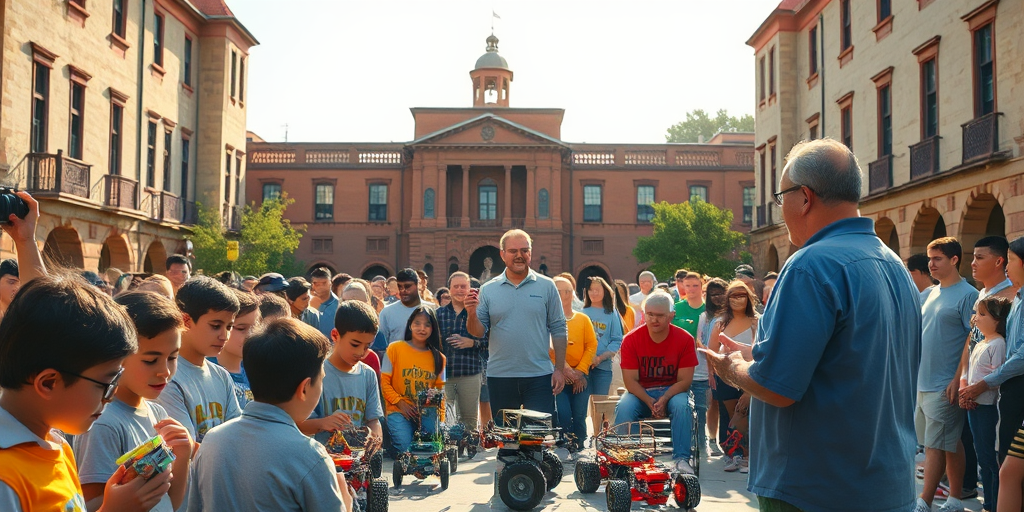Robotics Camp at STC Opens Doors for Neurodivergent Individuals
The vibrant community of the Rio Grande Valley is witnessing a new wave of empowerment for neurodivergent individuals, thanks to an innovative program at South Texas College (STC). Team Mario’s Summer Robotics Camp, recently hosted on STC’s Mid-Valley Campus in Weslaco, is paving the way for individuals on the Autism Spectrum Disorder (ASD) to engage with the burgeoning fields of robotics and coding.
Breaking New Ground in Education
The camp is part of Team Mario’s SOAR Program, which aims to provide educational and social opportunities for individuals with autism. By engaging these young minds in STEM (Science, Technology, Engineering, Mathematics) activities, the program not only enhances their technical skills but also opens up new avenues for social interaction and higher education pursuits.
For many participants, this was their first experience being on a college campus, providing a glimpse of a future filled with academic possibilities. Team Mario’s commitment goes beyond mere technical skills, emphasizing the potential and capabilities of neurodiverse individuals.
Jordan Hernandez, an instructor with the Texas Robotic Alliance, reflected on the camp’s impact: “It’s incredibly rewarding to give kids with ASD the opportunity to explore what’s possible in STEM. There are so many careers in robotics and coding, and seeing these students succeed and enjoy themselves is very fulfilling.”
Local Impact: Bringing Change to the Valley
The implications for the Rio Grande Valley community are profound. By creating inclusive educational environments, programs like these challenge stereotypes and break down barriers for individuals with autism. As Christine Clifford, Program Director for Team Mario, notes, “One of our goals is to offer programs in community venues. Having the camp here at STC is incredible because students were able to engage with their peers in a college environment. For many, this was their first time on a college campus and it was powerful to hear them say things like, ‘I can go to college too.’”
STC Campus Administrator Daniel Montez echoed these sentiments, emphasizing the college’s commitment to inclusion. “We are all about inclusion at STC and our goal is to ensure that as many individuals as possible have access to education and training opportunities. Camps like this are incredibly important because they provide a platform for neurodivergent students to discover and showcase their unique skills and talents,” Montez stated.
The Road Ahead: Potential Impact on the Community
As the robotics camp gains recognition, its success could set a precedent for similar programs throughout South Texas and beyond. The initiative aligns with broader educational goals, addressing the need for greater awareness and inclusion of individuals on the autism spectrum.
Krystal Garcia, another program director with Team Mario, believes exposure is essential for unlocking each student’s potential. “This camp gives students the chance to explore if STEM might be their niche,” she explained. “Sometimes we underestimate their capabilities simply because they haven’t had the opportunity to try. Exposure can open doors to talents and interests they never knew they had.”
Building a More Inclusive Community
By nurturing an environment where neurodivergent individuals feel supported and empowered, the program sends a powerful message to the community: inclusion is not only possible, but vital. It challenges outdated assumptions and fosters a culture where diversity is celebrated.
“We hope more people hear about this camp,” Garcia added. “It’s not just about robotics—it’s about opening minds and creating spaces where all students feel seen, supported, and capable.”
Connecting Past, Present, and Future
The importance of such initiatives cannot be overstated. Historically, neurodivergent individuals have faced significant challenges in accessing resources and educational opportunities. Programs like Team Mario’s Summer Robotics Camp represent a shift towards inclusivity, offering a supportive space where all individuals can thrive.
Karina Ramirez, a local advocate for autism awareness in Hidalgo County, highlighted the community’s evolving understanding. “For too long, individuals with autism have been misunderstood or overlooked. It’s heartening to see initiatives like this taking root in the Valley. They not only offer practical skills but also respect and value each person’s potential,” Ramirez said.
A Call to Action
As the camp continues to inspire and motivate, there is a call for further collaboration and community support. By investing in programs that embrace inclusivity and diversity, the Rio Grande Valley can better harness the potential within its community.
Residents interested in learning more or supporting Team Mario and similar programs are encouraged to reach out through the contact information provided by Texas Border Business. With continued enthusiasm and advocacy, the future for neurodivergent individuals in the Valley looks promising.
In conclusion, Team Mario’s Summer Robotics Camp at STC exemplifies the transformative power of education and inclusion. By opening doors to new possibilities, it strengthens the Rio Grande Valley’s commitment to a future where all young people, regardless of neurodiversity, receive the opportunity to realize their full potential.







